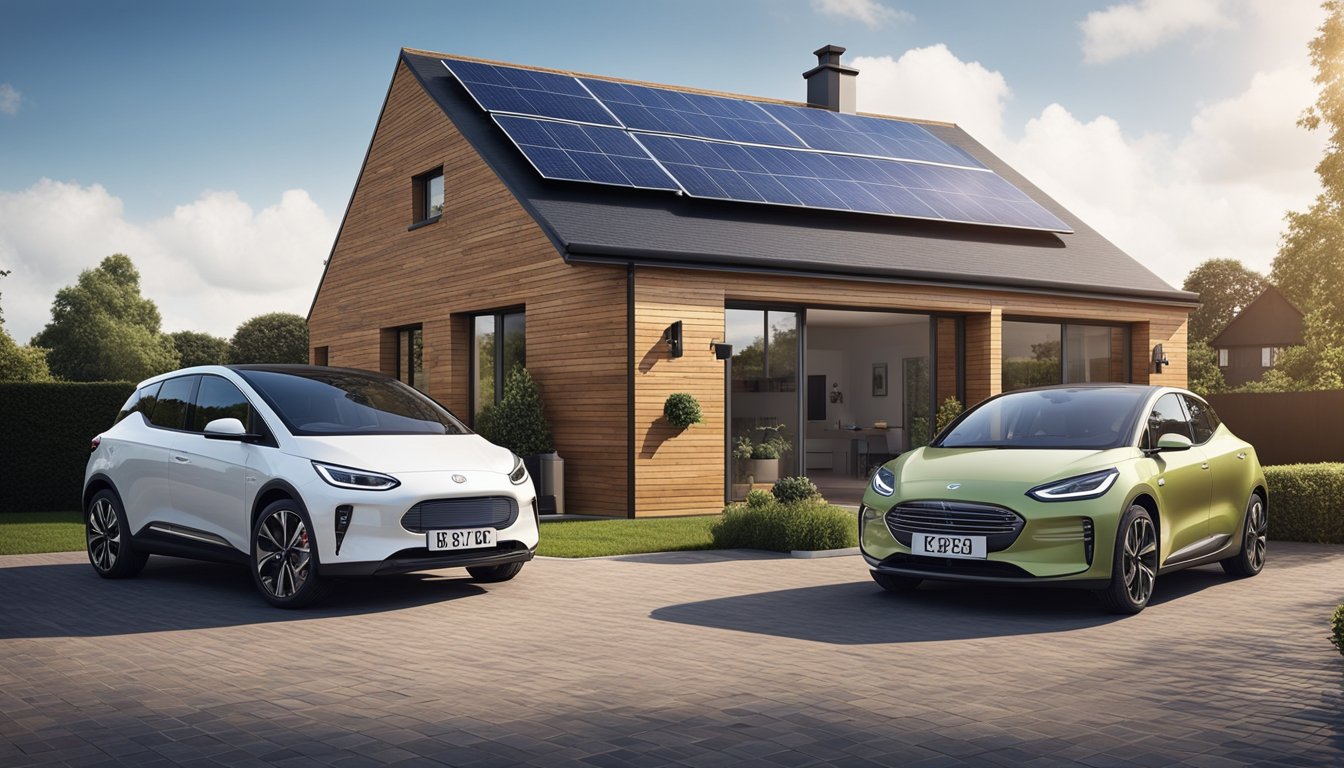Late updated: 31 Dec 2024 16:12
Written by: Eleanor Hartman
Best Home Energy Storage Options For UK Homes: A Comprehensive Guide
Exploring home energy storage options is a crucial step for UK homeowners looking to enhance energy independence and efficiency. With fluctuating energy bills and the growing need for renewable energy, understanding which storage solution suits your home best is essential. Among the various solutions, solar batteries stand out, offering a practical way to store renewable energy and reduce reliance on the grid.

UK homes have diverse energy storage needs, driven by the variety in household sizes and energy consumption patterns. From compact, efficient systems like the Tesla Powerwall 3 to larger setups like SunVault, there are solutions tailored to both urban homes and larger rural properties. Our homes can benefit not only economically but also environmentally by integrating advanced solar panels and energy storage options, making renewable energy more accessible and sustainable.
As we navigate the evolving landscape of home energy technology, selecting the right storage solution will depend on specific needs and goals. Identifying options that offer both high capacity and adaptability ensures better alignment with future energy requirements. This journey towards energy sustainability not only supports our wallets but also paves the way to a greener tomorrow.
Key Takeaways
- Home energy storage enhances energy independence and efficiency.
- Solar batteries provide a practical solution for renewable energy storage.
- Choosing the right storage system depends on specific household needs.
Understanding Home Energy Storage
The increasing interest in sustainable living has led many UK homeowners to explore energy storage solutions, particularly when combined with solar panels. These systems allow us to store and utilise energy more efficiently, enabling significant energy savings and contributing to a greener environment.
The Role of Solar Panels and Batteries in the UK
Solar panels are essential for harnessing solar energy, which can be stored using battery energy storage systems. In the UK, home energy storage typically involves integrating solar panels with battery storage options to store excess energy generated during daylight. This stored energy can be used at night or during periods of low sunlight, improving our energy efficiency and reducing reliance on the grid.
Solar battery storage options vary, with lithium-ion batteries being the most popular choice due to their high efficiency, longevity, and decreasing costs. These batteries can be paired with solar PV systems to maximise energy utilisation, ensuring we have a reliable backup when solar generation is low.
Battery Technology for Residential Use
Battery technology has advanced significantly, offering solutions that suit different needs and budgets. Lithium-ion and lithium iron phosphate are among the most popular types due to their capacity, longevity, and reliability. They offer a balanced combination of performance and price for homeowners looking to invest in solar battery solutions.
The usable capacity and depth of discharge are key factors to consider when choosing a battery. These determine how much energy can be stored and discharged safely, with modern batteries providing up to 90% usable capacity. We often recommend focusing on these features to ensure optimal energy consumption efficiency.
Sizing and Selecting the Right System
Selecting the right battery storage system requires us to consider several factors, including energy needs, budget, and available space. Calculating energy consumption in kilowatt-hours helps in assessing the necessary battery capacity. This ensures the system can meet our daily energy requirements without wasting energy.
For accurate sizing, analysing past energy bills and conducting an energy audit can provide insights into consumption patterns. Consulting professionals for installation ensures compatibility with existing solar PV systems and optimises performance. By considering these aspects, we can make informed decisions about the right solar battery for our homes.
When choosing a system, balancing initial investment with long-term savings is crucial. A higher battery lifespan often justifies a larger solar battery budget, as it secures energy independence for years to come.
Economic and Environmental Benefits

Home energy storage solutions provide significant advantages for UK households. By investing in these systems, not only can we achieve substantial financial savings, but we can also contribute positively to environmental sustainability. Here, we delve into the economic incentives, reduction of carbon footprints, and the increased energy security provided by these technologies.
Financial Incentives and Payback Period
Investing in home energy storage often results in energy bill savings through the optimisation of time-of-use rates. By storing energy during off-peak hours, we can utilise it when prices are higher, thus reducing costs. Many systems offer a strong return on investment, driven by long-term savings on energy expenses.
Government incentives and grants further enhance financial benefits. These may include subsidies for adopting renewable energy systems or rebates for installing battery storage solutions. The payback period may vary, but we generally see it being recouped within a few years due to consistent energy savings. This financial relief makes energy storage not only a smart economic choice but also a step toward meeting national energy goals.
Reducing Carbon Footprint with Renewable Integration
By integrating renewable energy sources like solar panels with home storage systems, we can significantly reduce our carbon footprint. Stored energy from solar allows us to rely less on fossil fuels, thus lowering greenhouse gas emissions. This move supports broader environmental goals and contributes to a sustainable future.
Using renewable sources also means that our energy needs can be met without excessive environmental strains. Continuous advancements in technology ensure that these systems keep getting more efficient and environmentally friendly, pushing us closer to achieving national and global energy targets.
Energy Security and Grid Independence
Home energy storage elevates our energy security by ensuring a reliable supply during power outages. It offers a degree of grid independence, especially when integrated with virtual power plants. This is crucial during peak demand times or when the national grid is under stress.
By achieving a level of energy independence, we safeguard against fluctuating energy prices and supply disruptions. For those in remote areas or with unreliable grid connections, off-grid systems provide valuable backup power, ensuring continuous energy availability. This independence from traditional power sources supports both our energy needs and mitigates potential disruptions.
Frequently Asked Questions

Let's address some common queries about home energy storage options in the UK. We'll explore the efficiency of battery systems, cost implications, available incentives, and the impact on electricity bills.
What are the advantages of installing a home battery storage system without solar panels in the UK?
Home battery storage systems can offer energy independence and efficiency. They allow households to store electricity from the grid at off-peak times when rates are lower. This setup provides backup power during outages and reduces overall reliance on the grid.
How does the cost of solar battery storage compare for UK homeowners?
The cost varies greatly depending on the system's capacity and brand. On average, prices can range from a few thousand pounds to over £10,000. It's essential to consider long-term savings in energy bills when evaluating the initial investment.
Are there any incentives or schemes for free solar battery storage available in the UK?
Several schemes, such as the Smart Export Guarantee, encourage renewable energy adoption. While 'free' battery storage options are limited, some areas may receive financial assistance or reduced costs through local government initiatives or energy company offerings.
Which solar battery storage system is considered the most efficient for UK households?
The Tesla Powerwall is a popular choice due to its high efficiency and capacity. It offers seamless integration with solar panels and energy management systems. Other competitive brands include LG Chem and Sonnen, each offering unique advantages.
Can installing a battery with solar panels significantly reduce electricity bills in the UK?
Yes, combining solar panels with battery storage allows homeowners to maximise energy use from photovoltaic systems. By storing excess solar energy, households can reduce dependence on the grid, thereby lowering electricity bills significantly.
What size of battery storage would be needed to power a typical UK home?
The average UK home requires a system that can store around 8-12 kWh to meet daily energy needs. However, the exact size depends on individual household energy consumption patterns and whether the home has a solar system to complement storage.